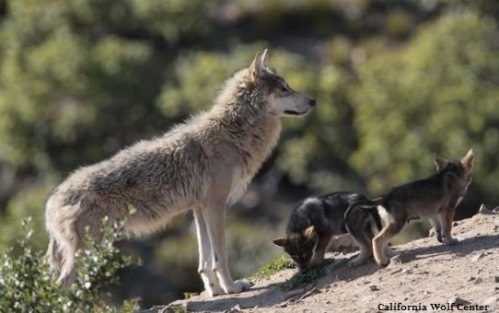Act Now: Stop US Fish and Wildlife Service from trapping Bluestem wolves!
 U.S. Fish and Wildlife Service (USFWS) quietly issued a decision last month to trap wolves from the Bluestem Pack in Arizona if its members depredate on livestock by November 1st. With only 110 in the wild, every wild Mexican wolf is important, yet USFWS continues to treat these wolves as expendable.
U.S. Fish and Wildlife Service (USFWS) quietly issued a decision last month to trap wolves from the Bluestem Pack in Arizona if its members depredate on livestock by November 1st. With only 110 in the wild, every wild Mexican wolf is important, yet USFWS continues to treat these wolves as expendable.
Please contact USFWS today and urge them to help move the cattle, not the wolves.
The Bluestem pack has pups born this summer. Even if USFWS does not trap the pups or the parents, trapping and removing other pack members will disrupt the Bluestem family and place all of its members at risk of accidental death or injury.
Instead of scapegoating and removing rare wolves for livestock losses, the government should release more wolves into the wild and work with livestock owners to implement the full range of available, proven-effective prevention measures.
In this case, the affected grazing permittee indicated a willingness to move his cattle away from the wolves over a month ago if he could get the necessary assistance to do so. As it is, the grazing season in this area ends November 1st and helping to move these cattle a few days early would likely cost USFWS far less than trapping these endangered wolves. And it would avoid the risk of wolves being injured or killed, which is invaluable.
Please call U.S. Fish and Wildlife Service and tell them that trapping critically endangered animals over livestock depredations is unacceptable.
 Here are three key points to make when you call:
Here are three key points to make when you call:
1. The decision to leave the Bluestem wolves in the wild is the right one, and it should not be conditional. The government should not target critically endangered wolves for death or permanent removal.
Removing wolves will disrupt this family and will place all of the wolves nearby at risk, since capture carries a high risk of accidental death or injury. And it perpetuates a failed policy of scapegoating wolves who occasionally prey on livestock — even when compensation is available for the stock owner. The U.S. Fish and Wildlife Service should prioritize getting the livestock moved instead.
2. The US Fish and Wildlife Service should release many more wolves, and should not remove wolves over livestock losses.
At last count, just 110 wolves survived in the wild. If the USFWS is truly concerned about the growth of the population and its genetic health, the answer is more releases of captive wolves, not more wild wolves lost to risky trapping operations and permanent captivity.
3. Moving Mexican gray wolves closer to extinction is not the solution to livestock conflicts.
There are many solutions to conflicts between livestock and wolves. There are very few Mexican gray wolves. Livestock businesses on public lands are reimbursed for losses and can receive government and non-profit assistance for non-lethal measures to avoid depredation. They have a responsibility to do so. Deterrents to livestock conflicts are the solution, not removing more endangered Mexican wolves.
Please call the US Fish and Wildlife Service today!
Mexican Wolf Recovery Coordinator: 505-346-2525
Main Office: 505-248-6920
Phone calls usually carry more weight than emails, but if you absolutely can’t call, here are email addresses:
U.S. Fish and Wildlife Service, Southwest Regional Director — Dr. Benjamin Tuggle: RDTuggle@fws.gov
U.S. Fish and Wildlife Service Mexican Wolf Recovery Coordinator – Sherry Barrett: mexicanwolfcomments@fws.gov
Here are some facts about Mexican gray wolves and livestock:
There are only about 110 Mexican gray wolves in the wild in the Southwest and they are listed for protection as an Endangered Species.
There are millions of domestic livestock in the Southwest, according to the National Agricultural Statistics Service. From 1998-2014, only 266 livestock deaths and 51 livestock injuries in the Southwest were attributed to wolves.
In Arizona, wolves are responsible for less than one percent of livestock losses; in New Mexico, wolves are responsible for less than one half of one percent of livestock losses.
To minimize the costs to individual livestock owners of losing livestock to wolves, multiple compensation programs are in place, as well as help to implement coexistence measures that significantly reduce the likelihood of depredations occurring in the first place.
In spite of repeated warnings from scientists that the wild population desperately needs genetic rescue to combat inbreeding that threatens the wolves’ future, USFWS only released 4 new Mexican gray wolves into the wild from 2007-2014. During the same period, USFWS killed or removed 5 wolves from the wild over livestock conflicts, including a mother wolf who had young pups at the time she was trapped.



